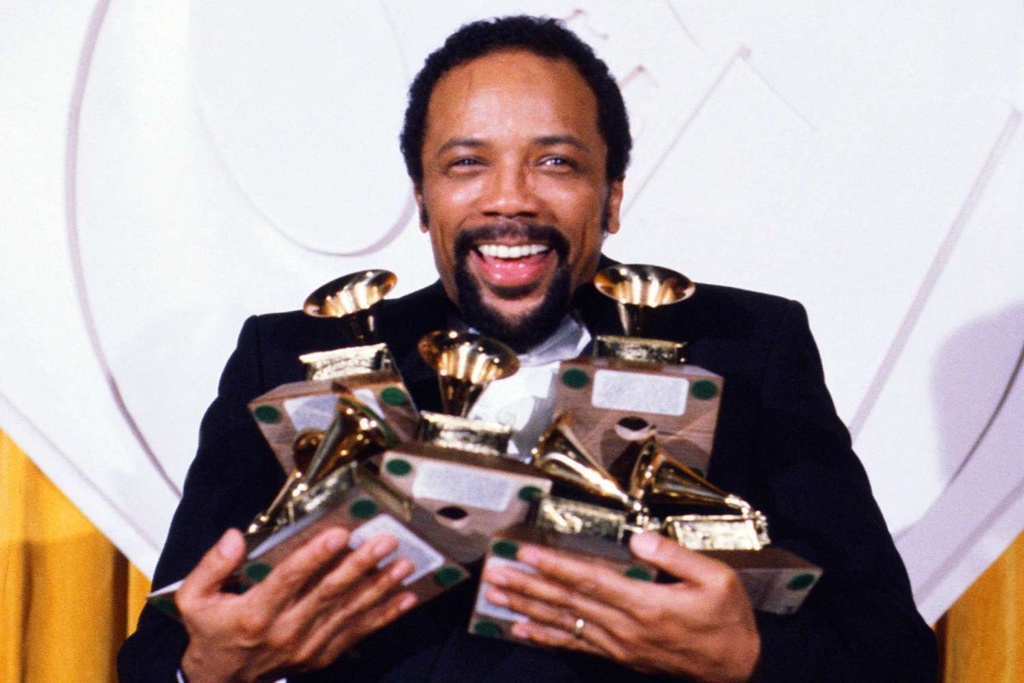Quincy Jones, musician and producer who worked with Michael Jackson, Frank Sinatra and many others, has died at the age of 91.
Jones’ publicist, Arnold Robinson, said he “passed away peacefully” on Sunday night at his home in Bel Air.
“Tonight, with full but broken hearts, we must share the news of our father and brother Quincy Jones’ passing. And although this is an incredible loss for our family, we celebrate the great life that he lived and know there will never be another like him,” the family said in a statement.
Jones was best known as the producer of Michael Jackson’s Thriller album.
Quincy Delight Jones Jr., known to many as Quincy Jones, was a towering figure in the music industry and beyond. With a career spanning over seven decades, Jones left an indelible mark on jazz, pop, and film music, becoming one of the most influential and celebrated producers, composers, and arrangers in modern history. His passing at the age of 91 marks the end of an era but leaves behind a legacy that will continue to shape music and culture for generations.
Born on March 14, 1933, in Chicago, Illinois, Quincy Jones moved to Seattle with his family during his childhood. He grew up amidst a challenging environment but discovered music as a young boy, initially learning the trumpet. Jones attended the prestigious Berklee College of Music in Boston, but he left early to pursue his career. His first big break came as a trumpeter and arranger for Lionel Hampton’s band, which propelled him into the jazz scene. Jones quickly gained recognition as a talented arranger, eventually working with legends such as Ray Charles, who would become a lifelong friend.
Rise to Prominence
Jones’ career evolved in the 1950s and 1960s, as he expanded from jazz into pop and R&B. His work as an arranger for renowned artists like Frank Sinatra and Count Basie brought him mainstream success, and he became one of the few Black music executives to lead a major record label division when he became vice president at Mercury Records in 1964. During this time, Jones also worked extensively as a film composer, scoring films such as The Pawnbroker (1965) and In the Heat of the Night (1967), which cemented his reputation as a versatile composer and arranger.
Breakthrough and Collaboration with Michael Jackson
The 1980s marked a defining era in Jones’ career, thanks in large part to his collaboration with Michael Jackson. Their work on Off the Wall (1979) set new standards in pop music production, blending funk, disco, and R&B. However, it was Thriller (1982), Jackson’s second album with Jones, that would become the best-selling album of all time, earning Jones widespread acclaim and securing his place in music history. He also produced Jackson’s Bad (1987) album, further solidifying his influence in the pop music landscape.
In addition to music, Jones made significant contributions to film and television, including producing the beloved television series The Fresh Prince of Bel-Air and the film adaptation of The Color Purple (1985). His production company, Quincy Jones Productions, became a powerhouse in entertainment, shaping the cultural landscape of the 1980s and 1990s.
Jones also used his platform for social causes, spearheading the We Are the World project in 1985, which raised millions for famine relief in Africa. Known for his commitment to civil rights, he supported numerous organizations promoting education, humanitarian aid, and racial equality.
Quincy Jones received countless awards throughout his career, including 28 Grammy Awards and an Emmy. He was honored with an Academy Award nomination and is one of the few to achieve a Grammy Legend Award. In 2013, Jones was inducted into the Rock and Roll Hall of Fame, and he received a Kennedy Center Honor in 2001. His influence transcended genres and generations, touching the lives of musicians and listeners around the world.
In his later years, Jones remained an active figure in the music and entertainment industry, serving as a mentor to young artists and continuing to inspire through interviews, documentaries, and public speaking. His 2018 Netflix documentary, Quincy, offered an in-depth look at his life, career, and personal reflections.
Jones is survived by his seven children, who continue his legacy in various fields, and a legion of admirers who revere him as a pioneer, an innovator, and a compassionate advocate for cultural progress.
C
The passing of Quincy Jones at 91 marks the end of an extraordinary life that transcended boundaries in music, film, and social justice. He was a man of many talents and relentless vision, embodying a commitment to excellence that few have matched. While Quincy Jones may be gone, his music, his influence, and his legacy live on, reminding us of the power of art and the enduring impact of a life dedicated to creativity and social change.

